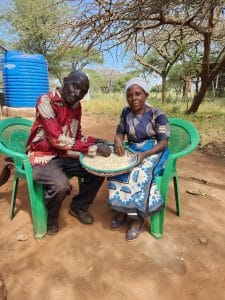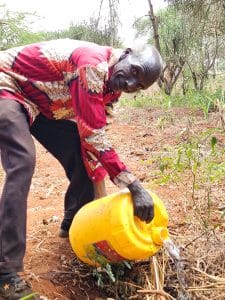Being trained together as a Gender Model Family (GMF), said Ann Mutuku, made it easier for her husband, Henry Mutuku, to accept the changes proposed in their household. She notes, “you have to be gentle when bringing about change and offering advice.”
In October 2023, Ann and Henry became one of 20 families in Kenya to undergo GMF training. This two-day session, offered by the Co-operative Development Foundation of Canada (CDF Canada), aims to address disparities in power dynamics and decision-making related to household resources. By challenging conventional gender roles and responsibilities, the training empowers couples and their children to become exemplars of progressive gender dynamics. After the training, each family is encouraged to implement these learnings within their households.

Henry and Ann with a bowl of peas.
Ann, reflecting on the experience, shared that she had “never experienced such training before” and was “very happy” to participate. Henry agrees, stating that the training has fostered greater “harmony and peace” within their family. Before the training, challenges existed between parents and children, but now the children “see the positive impact” and try to emulate their parents.
Married for 44 years, with nine children and nine grandchildren, Ann and Henry live in Makueni County. Since the GMF training, they have begun supporting each other in household chores, a task they had previously handled independently. Ann explains that Henry now willingly takes on tasks traditionally seen as women’s work. Henry adds that they “analyze the activities we need to do and agree together on where to start.” If Ann is busy, Henry steps in, whether it’s cleaning the compound or fetching water.
The changes extend beyond chores. Ann now has a say in financial matters, something that was previously off-limits. Henry, who once forbade her from borrowing money, now supports her decisions, having observed positive changes in her. Ann recalls how Henry used to “dictate” how money was spent, but now, “he brings the finances to the table, and we draw up the budget together.” She also has full control over the earnings from the poultry she raises. The impact of the Mutuku family’s transformation extends beyond their household to their extended family and the wider community. Ann shares that local women have started approaching her, curious about the changes they see in her relationship with Henry – such as walking together to church and to the market.
“The community is surprised by our new dynamic,” she said. “Many of them are trying to follow our example.”
Henry acknowledges that while most of the community responds positively, some still criticize the shift in roles.
“Some people complain that I’m doing activities traditionally seen as women’s work,” he admitted.
The training has also helped Henry reconcile with his extended family, with whom he had a falling out. Inspired by the positive changes in his household, Henry is now planning a family meeting to share what they’ve learned, hoping others will follow suit. In fact, Henry is urging CDF Canada to offer more GMF training because of the positive impact it has had on his life, believing it can bring similar benefits to more families.

Henry watering a tree.
The Gender Model Family project will continue to engage participating families, helping to spread the values, actions, and outcomes of this training to other co-operative members and the broader community. Through these efforts, CDF Canada and the VOICE program are not just transforming individual households—they’re fostering a movement for gender equality and harmonious family dynamics across Kenya.
Gender Model Family
As part of CDF Canada’s approaches towards gender transformation, the Gender Model Family (GMF) approach is incorporated to address gender inequalities at both the household and community levels by promoting equitable division of unpaid work. It begins with training on basic gender concepts to build an understanding of the unequal distribution of care work between men and women. After the initial training sessions on gender awareness, participants assess the division of domestic chores in their own household and compare the daily activity profiles of women and men. They then work together to devise a household action plan that assigns chores in a more equitable way. As both men and women contribute to household work, they have time to engage in other income-generating activities and have more free time to enjoy as a family. This involves a series of trainings and follow-up sessions.
To date, the approach has brought on positive outcomes for project participants, in terms of more gender-equitable family dynamics and overall community cohesiveness. Along with CDF Canada’s co-operative development approaches that create an enabling environment for Women’s Economic Empowerment, the GMF approach is fostering social transformations that allow women to develop their professional skills and excel as entrepreneurs, all with the help and support of their husbands and male family members.